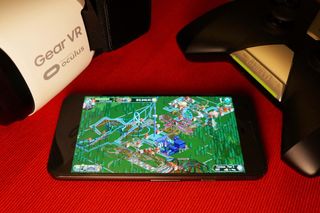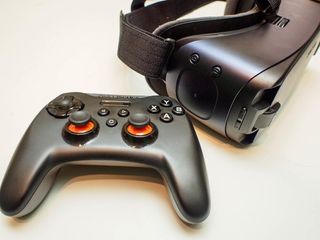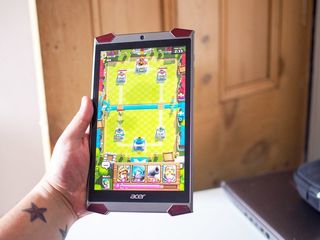State of Android Gaming 2017

This past year may go down as a banner year for Android gaming. We saw some big tech advancements in virtual reality and augmented reality, a great mix of outstanding games from indie developers and established franchises, and we're looking forward to more of that good stuff in 2017.
Here's what I saw as the trends and highlights from 2016, and what I'm looking forward to most in the new year.
Virtual reality and augmented reality

Virtual reality was huge in 2016, and it wasn't just relegated to those fortunate enough to try or own an HTC Vive, Oculus Rift, or Playstation VR. On top of seeing the ongoing development and refinement of the Samsung Gear VR, we saw Google announce their own VR platform, Daydream.
From what we've seen at CES 2017, companies are excited to jump onto the VR bandwagon. There's a growing number of Daydream-ready devices, from the Google Pixel and Moto Z, Huawei Mate 9 Pro, and the ZTE Axon 7 (once it gets Nougat), which is great news. Mobile VR is by far the most affordable and accessible way for the average consumer, so the more attention being spent by companies means we should be in for much more VR gaming action in 2017.
Pokémon Go — love it or hate it — was an absolute force throughout the summer of 2016 and is still — incredibly — maintaining momentum heading into 2017.
Shifting from virtual reality to augmented reality, Pokémon Go — love it or hate it — was an absolute force throughout the summer and is still, incredibly, somewhat relevant heading into 2017. For anyone who missed out on the Ingress craze, Pokémon Go was likely their first dive into playing a game that uses augmented reality.
But also like Ingress, Pokémon Go is a tough game to jump into this far after the initial release and buzz. Any new Pokémon Go players are stuck grinding for a summer's worth of days before they'll be able to make a dent at a gym, and therein lies one of the biggest issues with massively multiplayer augmented reality games.
But there's still so much untapped potential for future augmented reality titles. Take Clandestine Anomaly, a single-player gaming experience that lets you play from the comfort of your home, or wander out into your neighbourhood to use your phone's camera to shoot aliens out of the sky. It came out before Pokémon Go, but saw a spike in downloads after its sibling opened the world's eyes to AR gaming. Here's hoping that Pokémon Go's success inspires other game developers.
Be an expert in 5 minutes
Get the latest news from Android Central, your trusted companion in the world of Android
Will there be more augmented reality gaming coming our ways in 2017? I sure hope so!
I'd rather pay for the full game than play free-to-play modes

One of the biggest knocks on mobile gaming is the way so many games rely on the freemium model, whether it's accomplished by bombarding you with offers on in-app purchases to supercharge your character or deck in an online game, or throwing up frustrating roadblocks meant to entice you into paying for upgrades or whatnot.
For many years, this seemed like a fair compromise because the average person probably didn't own a phone capable of lengthy gaming sessions. in 2017, That's no longer the case. The last few years of flagships are more than capable to run full games, and there are a growing number of mid-range phones that are more than capable for gaming.
It's frustrating to see so many games where the gameplay itself is hindered by limitations or commerce structures put in place by the developers.
It's frustrating to see so many games where the gameplay itself is hindered by limitations or commerce structures put in place by the developers. There's no genre affected by this worse than sports games, where the games with the best graphics and gameplay are almost always hitched to a clunky card-based Ultimate Team mechanic. I mean, I get it — opening packs or crates gives that dopamine rush of gambling and makes us want to come back for more… and more.
But you know what also keeps my attention? Really well-made games that I can just play for a few minutes or a few hours. I sunk countless hours into FIFA 13's Manager Mode, playing through multiple full seasons with my favorite team. For that edition, EA provided a spot-on representation of what I'd come to expect from the same mode from its console counterpart, and it was amazing. When they shifted focus away from that straightforward gameplay towards the freemium card-collecting model, it just wasn't the same for me.
Another example: take the difference between Rollercoaster Tycoon 4 Mobile, a game 'designed for mobile' with social media integration and layers of in-game currencies to contend with, and Rollercoaster Tycoon Classic, essentially a direct port of the classic PC game that's been restored to its former glory on Android devices. Why settle for compromises when you can — and should be — getting the full gaming experience with no compromises.
If you agree, make sure you put your money where your mouth is and support the games and developers you enjoy most.
Expect more hits of nostalgia

We've seen some gaming classics like Soul Calibur and the aforementioned Rollercoaster Tycoon Classic successfully released on Android, offering essentially the full gaming experience we remember from different platforms. I won't underestimate the technical challenges required to properly port a game, but with how damn easy and convenient it is to getting an emulator on nearly any device and illegally play through the whole catalogue of whichever retro console you desire, you would think companies would be champing at the bit to release those "retro classics" to an audience with an insatiable appetite for nostalgia. Just look at how wildly popular the NES Classic was this past holiday season. The market appears ripe for faithful ports of gaming classics, and it's time for companies to give the people what they want.
(But let's get things ported better than the disappointing Mega Man titles Capcom recently dropped into the Google Play Store).
The market appears ripe for faithful ports of gaming classics, and it's time for companies to give the people what they want.
Speaking of beloved video game characters, Super Mario Run is going to be coming to Android in 2017, and assuming it's as successful here as it was with the initial iOS launch, Nintendo seems poised to bring more cherished franchises and characters to iOS and Android. Depending on the lessons Nintendo learns from Super Mario Run, that could lead to some amazing gaming opportunities. Here's hoping for a Warioware reboot on Android — it would just makes sense!
Beyond that, we got a new Final Fantasy game specifically developed for mobile, a fantastic top-down scrolling shooter in Sky Force Reloaded, and Downwell, a fantastic new game with retro graphics — three different examples of games that hit us right in the nostalgia in different ways.
If you look at the film and TV landscape of the past five years, remakes and reboot reign supreme. The same trends are occurring in mobile gaming, for better or worse, and that means we're probably going to see more attempts to hit that same nostalgic tone. But we shouldn't settle for cheap knockoffs or bad ports of classics here, either.
Can the new NVIDIA Shield revitalize Android TV gaming?

While gaming continues to grow and improve on our phones, here's hoping for a revitalization of gaming on Android TV, which will likely be lead by the NVIDIA Shield.
NVIDIA made some big noise at CES 2017, announcing an updated version of their Android TV box along with the news that Google Assistant will be coming to the Shield with an system upgrade to Nougat. This, along with another CES announcement, the NVIDIA Spot — the first third-party product to use Google's Assistant AI— should help get more people interested in the NVIDIA Shield, which in turn will draw more attention from developers for more Android gaming content you can play on your TV. Games such as GoNNer and The Uncertain were great additions to the Shield line up in 2016, and I'm personally excited to see what's to come in 2017.
The Shield is positioning itself into a really interesting space as an outstanding streaming device… that also happens to also be a fully capable gaming machine. Despite its strengths, the Shield overlooked by a lot of people. But with those new features coming to the new NVIDIA Shield model as well as the first-generation box with the eventual upgrade to Nougat, here's hoping the Shield gets the attention it deserves from developers.
What do you think?
Which games stole your free time in 2016? Any games you're looking forward to? Let us know in the comments!
Marc Lagace was an Apps and Games Editor at Android Central between 2016 and 2020. You can reach out to him on Twitter [@spacelagace.

